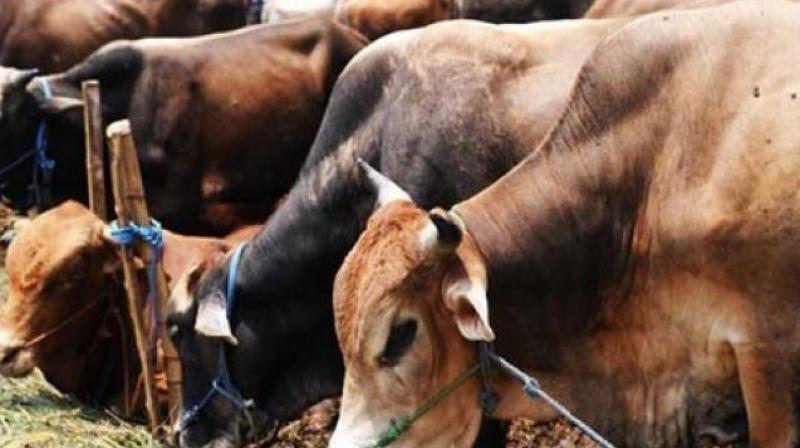Hyderabad: Avoid sacrificing cows this Bakrid, elders tell Muslims

Hyderabad: Several Muslims have started a campaign to avoid sacrificing cows and calves on the eve of Bakrid. No unpleasant incident occurred last year, but what is different this time is that organisations engaged in cow protection have become active a month before the festival. Muslims apprehend that there are possibilities of untoward incidents this year.
A delegation of the Vishwa Hindu Parishad had submitted a memorandum to Director-General of Police M. Mahendar Reddy and appealed to him to check slaughter of cows and calves on Bakrid. They urged him to take precautionary steps to check transport of cattle.
Fearing illegal seizure of cattle by ‘gau rakshaks’ and unnecessary clashes, many traders have decided not to trade in calves this year for Bakrid. Mr Mohammed Muneer Qureshi, secretary, All Jamiat ul Quraish, said vehicles carrying bulls and buffaloes were being stopped illegally by gau rakshaks on the outskirts.
The ‘gau rakshaks’ involve law-enforcing agencies to seize the cattle. The authorities do not shift seized cattle to government-run cattle shelters but to gaushalas run by private organisations. Mr Qureshi alleged that in a few places these groups were involved in the business and they shifted the cattle on their own on payment.
Muslim youths have been campaigning to avoid sacrificing cows and calves to avoid any untoward incident. Muslim traders have been advised not to take the risk of transporting cows and calves.
Mr Ilyas Shamsi, president, Reformers Front of India, urged the government to provide cattle legally for Bakrid sacrifice. He asked the government to sell the cattle through the animal husbandary department to avoid harassment from vigilante groups, which seemed more active this time. This would prevent problematic incidents that might affect communal harmony, he argued.
Moulana Abdur Raheem Khurram said sacrificing cows and calves was not obligatory in Islam. He said in India, Muslims had voluntarily been avoiding slaughtering of cows for decades. A few people still preferred calves as they were inexpensive compared to goats or sheep.
Moulana Zubair Ahmed Qasmi, general secretary, Jamiat Ulema-e-Hind, Telangana state chapter, said they were receiving phone calls from districts about the situation. “We are considering submitting a memorandum to the government requesting it to ensure peace and tranquillty before Id,” he said.
The moulana said Islamic scholars had advised the community to sacrifice goats or sheep to avoid unpleasant incidents. He said there was not much of a difference in the price as one share of calf cost about `3,500, against `5,000 for a goat or sheep.
Udhiyah or animal sacrifice reminds Muslims of the great act of sacrifice that Prophet Ibrahim (Abraham) and Prophet Isma`il (Ishmael) were willing to do for the sake of the Almighty.
The sacrifice is a form of showing thanks and gratitude to the Almighty. Offering Udhiyah during Bakrid is regarded as mandatory in a few schools of thought while it is Sunnah according to a few jurists. A Muslim who is financially able to afford it, is encouraged strongly to offer it to feed the poor, his family and relatives and his own self.
Only camels, cattle, sheep or goats may be slaughtered. At the youngest, camels must be over five full years of age, cattle and goats over two years and sheep over one year. A single camel or cow fulfills the Sunnah for seven persons, though a goat or sheep only fulfills it for one.

